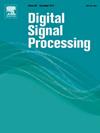Fuzzy adaptive bounded fraction non-Gaussian filter
IF 3
3区 工程技术
Q2 ENGINEERING, ELECTRICAL & ELECTRONIC
引用次数: 0
Abstract
In this paper, a novel non-Gaussian filter named the fuzzy adaptive bounded fraction non-Gaussian filter (FABFF) is proposed for addressing the filtering problem of linear non-Gaussian systems. The proposed filter integrates a robust loss function with a fuzzy membership function. First, a bounded fraction loss function is designed, which exhibits high robustness and numerical stability, effectively mitigating the impact of outliers. In addition, an adaptive parameterization scheme is developed based on the sample error for the bounded fraction loss function, which achieves a balance between the filtering accuracy and real-time performance compared to approaches using fixed parameters. Second, a novel weighted cost function is designed by incorporating sample weights, thereby improving the filtering accuracy compared to the cost function using average weights. The sample weights are determined based on the degrees of abnormality of each sample, which is quantified through a fuzzy membership function. By applying the fixed-point iterative method, the new cost function is solved, and FABFF is obtained. Subsequently, the performance of the bounded fraction loss function, the computational complexity, and the convergence of the proposed algorithm are analyzed. Finally, simulation results are presented to validate the effectiveness of the proposed algorithm.
模糊自适应有界分数非高斯滤波器
针对线性非高斯系统的滤波问题,提出了一种新的非高斯滤波器——模糊自适应有界分数非高斯滤波器(FABFF)。该滤波器集成了鲁棒损失函数和模糊隶属函数。首先,设计了有界分数损失函数,该函数具有较高的鲁棒性和数值稳定性,有效地减轻了异常值的影响;此外,针对有界分数损失函数,提出了一种基于样本误差的自适应参数化方案,与使用固定参数的方法相比,在滤波精度和实时性之间取得了平衡。其次,结合样本权值设计了一种新的加权代价函数,与使用平均权值的代价函数相比,提高了滤波精度;根据每个样本的异常程度确定样本权重,并通过模糊隶属函数对其进行量化。采用不动点迭代法,求解新的成本函数,得到FABFF。随后,分析了有界分数损失函数的性能、计算复杂度和算法的收敛性。最后给出了仿真结果,验证了算法的有效性。
本文章由计算机程序翻译,如有差异,请以英文原文为准。
求助全文
约1分钟内获得全文
求助全文
来源期刊

Digital Signal Processing
工程技术-工程:电子与电气
CiteScore
5.30
自引率
17.20%
发文量
435
审稿时长
66 days
期刊介绍:
Digital Signal Processing: A Review Journal is one of the oldest and most established journals in the field of signal processing yet it aims to be the most innovative. The Journal invites top quality research articles at the frontiers of research in all aspects of signal processing. Our objective is to provide a platform for the publication of ground-breaking research in signal processing with both academic and industrial appeal.
The journal has a special emphasis on statistical signal processing methodology such as Bayesian signal processing, and encourages articles on emerging applications of signal processing such as:
• big data• machine learning• internet of things• information security• systems biology and computational biology,• financial time series analysis,• autonomous vehicles,• quantum computing,• neuromorphic engineering,• human-computer interaction and intelligent user interfaces,• environmental signal processing,• geophysical signal processing including seismic signal processing,• chemioinformatics and bioinformatics,• audio, visual and performance arts,• disaster management and prevention,• renewable energy,
 求助内容:
求助内容: 应助结果提醒方式:
应助结果提醒方式:


